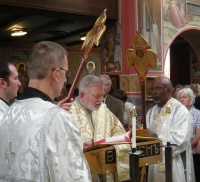Difference between revisions of "Liturgical fans"
(image change) |
m (moved Exapteriga to Liturgical fans: English terminology.) |
||
| (2 intermediate revisions by one other user not shown) | |||
| Line 1: | Line 1: | ||
| − | [[ | + | [[Image:GospelReadingStNichCath.JPG|right|thumb|200px|Exapteriga during the Gospel Reading.]] |
The '''Exapteriga''' (Slavonic: rapidia) is a fan made with a representation of a six-winged [[Seraphim]], the highest order of [[angel]], mounted on a pole or staff for hand carrying. The seraphim, according to Isaiah's vision of God, surround the throne of God in Heaven. The image of the seraphim is often engraved on a circular, usually metal, disk on the end of the staff. | The '''Exapteriga''' (Slavonic: rapidia) is a fan made with a representation of a six-winged [[Seraphim]], the highest order of [[angel]], mounted on a pole or staff for hand carrying. The seraphim, according to Isaiah's vision of God, surround the throne of God in Heaven. The image of the seraphim is often engraved on a circular, usually metal, disk on the end of the staff. | ||
Latest revision as of 02:12, October 21, 2013
The Exapteriga (Slavonic: rapidia) is a fan made with a representation of a six-winged Seraphim, the highest order of angel, mounted on a pole or staff for hand carrying. The seraphim, according to Isaiah's vision of God, surround the throne of God in Heaven. The image of the seraphim is often engraved on a circular, usually metal, disk on the end of the staff.
Two fans are found in most Orthodox churches placed on either side of the tabernacle when not in the hands of servers. The fans are reminders that these same angels surround the throne of God on earth — the Holy Altar.
During the Divine Liturgy the exapteriga are used to accompany the Holy Gifts during the Great Entrance and the Gospel Book when brought out for the Gospel reading.
